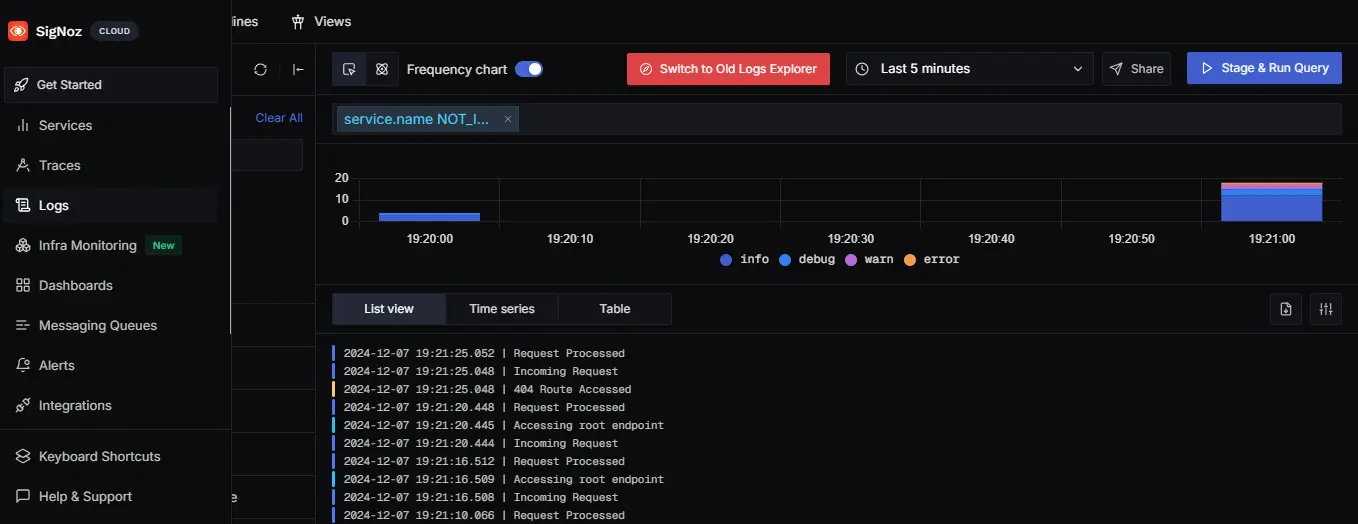Collecting Nodejs winston logs
If you are using winston as your logging library in your Nodejs application, you can export these logs to SigNoz very easily using various transports provided by winston.
The default logging level can be configured.
To send all the logs to SigNoz please change the default log level to DEBUG.
const logger = winston.createLogger({
level: 'debug',
// ... other configurations
});
For sending logs to SigNoz cloud, while running the above example set the below environment variables
The value of
OTEL_EXPORTER_OTLP_ENDPOINTenvironment variable will behttps://ingest.{region}.signoz.cloud:443/v1/logswhere depending on the choice of your region for SigNoz cloud, the otlp endpoint will vary according to this table.Region Endpoint US ingest.us.signoz.cloud:443 IN ingest.in.signoz.cloud:443 EU ingest.eu.signoz.cloud:443 The value of
SIGNOZ_ACCESS_TOKENenvironment variable will be<SIGNOZ_INGESTION_KEY>where<SIGNOZ_INGESTION_KEY>is your ingestion key
How to collect logs from Node.js Winston without the requiring Otel collectors
First we will install a few dependencies using npm
npm install @opentelemetry/api-logs @opentelemetry/sdk-logs @opentelemetry/exporter-logs-otlp-http @opentelemetry/winston-transport @opentelemetry/resources winston dotenvlogger.js
const logsAPI = require('@opentelemetry/api-logs') const { LoggerProvider, SimpleLogRecordProcessor } = require('@opentelemetry/sdk-logs') const { OTLPLogExporter } = require('@opentelemetry/exporter-logs-otlp-http') const { OpenTelemetryTransportV3 } = require('@opentelemetry/winston-transport') const { Resource } = require('@opentelemetry/resources') const winston = require('winston') require('dotenv').config() // Initialize the Logger provider const loggerProvider = new LoggerProvider({ resource: new Resource({ 'service.name': 'winston-logger', 'service.version': '1.0.0', 'deployment.environment': process.env.NODE_ENV || 'development', }), }) // Configure OTLP exporter for SigNoz const otlpExporter = new OTLPLogExporter({ url: process.env.OTEL_EXPORTER_OTLP_ENDPOINT, headers: { 'signoz-access-token': process.env.SIGNOZ_ACCESS_TOKEN, }, }) // Add processor with the OTLP exporter loggerProvider.addLogRecordProcessor(new SimpleLogRecordProcessor(otlpExporter)) // Set the global logger provider logsAPI.logs.setGlobalLoggerProvider(loggerProvider) // Create Winston logger with Console and OpenTelemetry transports const logger = winston.createLogger({ level: 'debug', format: winston.format.combine( winston.format.timestamp(), winston.format.errors({ stack: true }), winston.format.metadata(), winston.format.json() ), defaultMeta: { service: 'winston-logger', environment: process.env.NODE_ENV || 'development', }, transports: [ new OpenTelemetryTransportV3({ loggerProvider, logAttributes: { 'service.name': 'winston-logger', 'deployment.environment': process.env.NODE_ENV || 'development', }, }), ], }) module.exports = loggerexample index.js
const express = require('express') const logger = require('./logger') const { v4: uuidv4 } = require('uuid') const PORT = process.env.PORT || 5555 const app = express() app.use((req, res, next) => { const requestId = uuidv4() req.requestId = requestId logger.info({ message: 'Incoming Request', method: req.method, path: req.path, requestId: requestId, ipAddress: req.ip, userAgent: req.get('User-Agent'), }) req.startTime = Date.now() res.on('finish', () => { const duration = Date.now() - req.startTime logger.info({ message: 'Request Processed', method: req.method, path: req.path, requestId: requestId, statusCode: res.statusCode, responseTime: `${duration}ms`, }) }) next() }) app.use(express.json()) app.get('/', (req, res) => { try { logger.debug({ message: 'Accessing root endpoint', requestId: req.requestId, }) res.json({ method: req.method, message: 'Hello World', timestamp: new Date().toISOString(), requestId: req.requestId, }) } catch (error) { logger.error({ message: 'Error in root endpoint', error: error.message, stack: error.stack, requestId: req.requestId, }) res.status(500).json({ error: 'Internal Server Error' }) } }) app.get('/404', (req, res) => { logger.warn({ message: '404 Route Accessed', requestId: req.requestId, }) res.status(404).json({ error: 'Not Found', requestId: req.requestId, }) }) app.get('/user', (req, res) => { try { // Simulating an authentication failure throw new Error('Authentication Failed') } catch (error) { logger.error({ message: 'User Authentication Error', error: error.message, stack: error.stack, requestId: req.requestId, }) res.status(401).json({ error: 'Unauthorized', requestId: req.requestId, }) } }) app.use((err, req, res, next) => { logger.error({ message: 'Unhandled Error', error: err.message, stack: err.stack, requestId: req.requestId || 'unknown', }) res.status(500).json({ error: 'Unexpected Server Error', requestId: req.requestId || 'unknown', }) }) const server = app.listen(PORT, () => { logger.info({ message: 'Server Started', port: PORT, environment: process.env.NODE_ENV || 'development', }) console.log(`Listening on http://localhost:${PORT}`) }) process.on('SIGTERM', () => { logger.warn('SIGTERM received. Shutting down gracefully.') server.close(() => { logger.info('Server closed. Process terminating.') process.exit(0) }) }) module.exports = appNow you can run your application by running
node index.jsIf there are no errors your logs will be visible on SigNoz UI.
Collecting Nodejs logs when application is deployed on Docker or Kubernetes
When your application is deployed in Docker or a Kubernetes cluster, the logs from the console are automatically collected and stored in the node. The SigNoz collector will automatically collect the logs and they will be visible on the SigNoz UI.
Console Transport Configuration
You can easily add a console transport to your Winston logger with the following code:
logger.add(new winston.transports.Console(options))
The Console transport supports several configuration options:
- level: Specifies the level of messages this transport should log (default: level set on parent logger).
- silent: A boolean flag to suppress output (default is false).
- eol: Defines the end-of-line characters to use (default is
os.EOL). - stderrLevels: An array of log levels to be sent to stderr instead of stdout. For example:
['error', 'debug', 'info'](default is an empty array). - consoleWarnLevels: An array of log levels to use
console.warn()or stderr (in Node.js) instead of stdout. For example:['warn', 'debug'](default is an empty array).
Example configuration:
logger.add(
new winston.transports.Console({
level: 'info',
format: winston.format.simple(),
silent: false,
stderrLevels: ['error'],
})
)
By using these configuration options, you can fine-tune how your logs are output and collected when deployed in containerized environments like Docker or Kubernetes.
Collecting Nodejs logs when application is deployed on a Host
When you run your application directly on the host, you will be required to add a intermediary medium ex:- a file, where you can export your logs and the otel-collector can read them and push to signoz.
You can add a file transport very easily as stated here.
logger.add(new winston.transports.File({
filename: path.join(process.cwd(), 'logs', 'application.log'),
level: 'debug',
handleExceptions: true,
maxsize: 5242880, // 5MB
maxFiles: 5,
tailable: true,
}));
Once you run your application and the logs are added to a file, you can configure otel collector to read from that file.
For configuring it you can follow the guide here.
Once you configure the otel collector the logs will be visible on the UI.

